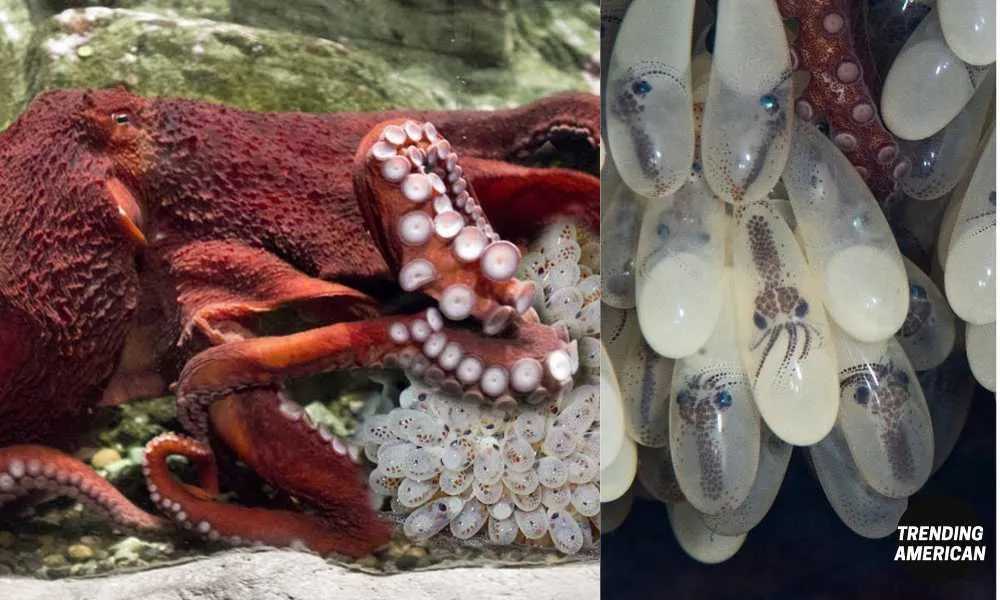How Mother Octopuses Protect Their Eggs?
Octopuses, fascinating creatures of the deep sea, display remarkable maternal behavior in ensuring the survival of their offspring. This article explores the strategies used by mother octopuses to protect their eggs and unique life cycle, nesting habits, and protective mechanisms.
Nesting and Egg Laying
Octopuses have a distinct life cycle that commences with reproduction. Female octopuses lay eggs during mating, which is pivotal in the species’ continuity. Each egg holds the ability to hatch and requires maternal care.
Mother octopuses choose safe nesting sites to protect their eggs from predators. Once a suitable location is found, the female octopus lays her eggs, with variations in this process among species.
Egg Protection Mechanisms
Octopuses employ a variety of egg protection mechanisms to ensure the survival of their offspring.
These include:
- Camouflage
Octopuses are adept at camouflage, using this ability to make their eggs blend seamlessly with their surroundings, rendering them difficult for predators to spot.
- Choice of Location
Octopuses frequently deposit their eggs in sheltered spots, like beneath rocks or crevices, shielding them from predators and environmental factors.
- Guarding
Female octopuses often act as sentinels for their eggs, diligently watching over them for weeks or months as a protective shield against potential predators.
- Egg Sacs
Some octopus species craft egg sacs from a robust material, enveloping their eggs within these protective coverings, which prove challenging for predators to breach.
- Immune Proteins
Octopus eggs produce proteins with antimicrobial properties, helping to fend off bacteria and other microorganisms, further fortifying their defenses.
In addition to these physical measures, octopuses employ behavioral strategies, such as altering their habits to evade predators. They may become more active during the night or less conspicuous during the day. And they might avoid areas with known predator presence.
Octopuses’ intelligence also plays a crucial role in safeguarding their eggs. They exhibit remarkable problem-solving abilities and creativity in constructing elaborate structures to shield their eggs from harm. Additionally, they utilize their camouflage talents to divert potential predators away from their vulnerable offspring.
These egg protection mechanisms collectively underscore octopuses’ dedication to ensuring their offspring’s survival, offering them a favorable chance to mature into adulthood.
Examples of these mechanisms in action include
- The common octopus (Octopus vulgaris) deposits its eggs in clusters beneath objects like rocks, and the female diligently guards them for up to 8 weeks until they hatch.
- The veined octopus (Octopus moschatus) creates robust egg sacs to envelop its eggs, ensuring they remain well-protected.
- The mimic octopus (Thaumoctopus mimicus) uses its ability to mimic various creatures. It includes predators, to deter threats from approaching its eggs. When guarding her eggs, the female mimic octopus might mimic the appearance of a toxic fish. It discourages potential predators from attacking.
Octopuses are truly captivating beings, and their egg protection mechanisms exemplify their extraordinary intelligence and adaptability in the face of the challenges of ocean life.
Self-Sacrifice for Offspring
The most remarkable aspect of octopus maternal behavior is their readiness to sacrifice their lives for their offspring’s safety. In the face of danger, some octopus mothers make the ultimate sacrifice, securing the survival of their genetic legacy and the continuity of their species.
Conclusion
Mother octopuses’ unwavering dedication to protecting their eggs underscores the extraordinary measures nature takes to ensure the survival of future generations. This article highlights the profound maternal instincts displayed by these creatures and invites readers to contemplate the depths of such instincts across the animal kingdom.
Also read:







